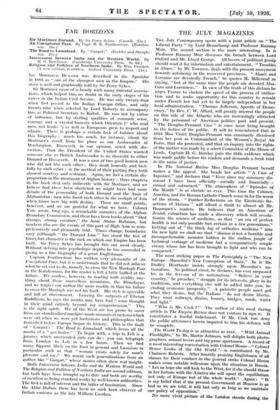FAR HORIZONS
Intercourse between India and the Western World. By
H. G. Rawlinson. (Cambridge University Press. 8s. 6d.) Religion and Folklore of Northern India. By Wm. Crookes.
(A new edition, rewritten. Oxford University Press. 21s.)
SIR MORTIMER DURAND was described in the Spectator in 1893 as "one of the strongest men in the Empire." His story is well and graphically told by Sir Percy Sykes.
Sir Mortimer came of a family with many Oriental associa- tions, which helped him no doubt in the early stages of his career in the Indian Civil Service. He was only twenty-four when first posted to the Indian Foreign Office, and only twenty-nine when selected by Lord Roberts to accompany him as Political Secretary to Kabul. He rose not by virtue of influence, but by sterling qualities of common sense, courage and a crystal honesty which Orientals (" who read men, not books ") as well as Europeans grew to respect and admire. There is perhaps a certain lack of balance about this biography : much too much, for instance, about Sir Mortimer's recall from his place as our Ambassador at Washington. Roosevelt, in our opinion, acted with dis- cretion. That the President of the United States wanted someone else as British Ambassador is no discredit to either Durand or Roosevelt. It was a case of two good honest men who did not like each other : they dealt honestly and tact- fully by each other : in the method of their parting they both showed courtesy and restraint. Again, we feel a certain dis- proportion in the treatment of Afghan history : three chapters in the book deal only indirectly with Sir Mortimer, and we believe had these been shortened we might have had more details of the personality of both Durand and the Amir of Afghanistan : men who faced each other in the cockpit of Asia when times were big with destiny. These are small points, however, and we are grateful for what we have. Colonel Yate wrote, long ago, a remarkable narrative of the Afghan Boundary Commission, and there have been books about "that strange, strong creature," the Amir Albdur Rahman, but nowhere else are the events of this part of High Asia so com- prehensively and pleasantly told. Times change, boundaries vary (although "the Durand Line" has stood the test of time), but character is the rock on which our Empire has been built. Sir Percy Sykes has brought this out most clearly. Without delving into psychologic depths he has succeeded in giving us a fine biography of a great Englishman.
Captain Featherstone has written very pleasantly of An Unexplored Pass, but it is unfortunate that he did not achieve what he set out to do, namely, to cross the New Muztagh Pass in the Karakorams, for the reader is left a little baffled at the failure. We confess, however, to reading with avidity any- thing about those marvellous mountains, the Himalayas, and we forgive our author the more readily in that his failure to cross the Muztagh was not his fault. His style is agreeable and full of discernment. Leaving the outposts of Tibetan Buddhism, he says the monks may have had "sonic thought in their mind entirely beyond my comprehension." This is the right spirit. We of the West are too prone to sneer from our standardized machine-made summits at customs which were old when we were yet barbarians and philosophies that flourished before Europe began its history. This is the fault of Ganpat's " The Road to Lamaland, which bears all the marks of a "pot-boiler." To begin with, a trip to Leh is a journey which unattended girls can do : you can telegraph from London to Leh in a few hours. Then we find many flippant libels on the East in general and Lamaism in particular. such as that "woman exists solely for man's pleasure t.nd use." We resent such generalizations from an author like " Ganpat," whose stories often show real insight. Both Intercourse between India and the Western World and The Religion and Folklore of Northern India are second editions, but both have been brought up to date and both are worthy of mention as being standard works by well-known authorities. The first is full of interest and the latter of fascination. Since the Abbe Dubois there has been no such keen observer of Indian customs as the late William Crookes.










































 Previous page
Previous page